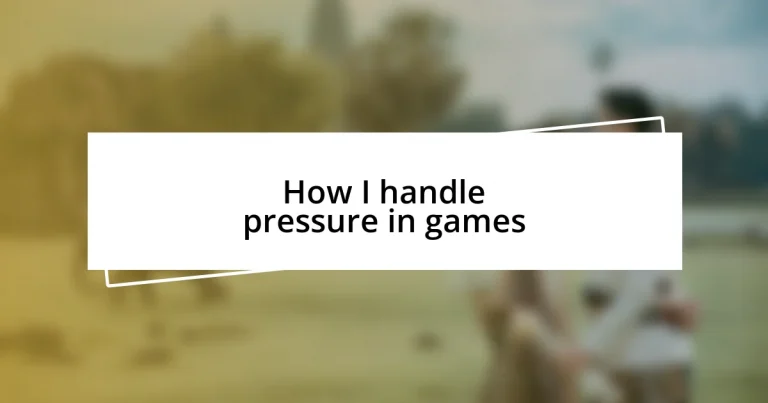Key takeaways:
- Understanding and embracing pressure can transform anxiety into motivation and enhance performance.
- Developing personalized strategies, like deep breathing and visualization, helps manage stress and maintain focus during high-stakes moments.
- Post-game reflection and discussions with teammates promote growth and improve overall performance by identifying patterns and fostering a supportive environment.
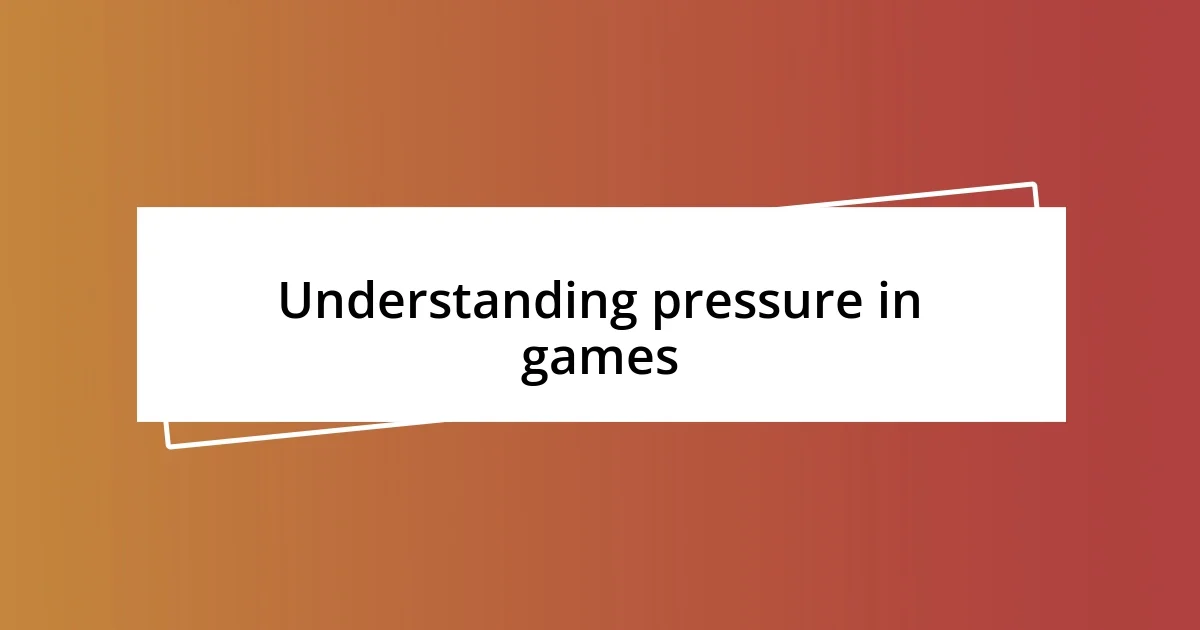
Understanding pressure in games
Pressure in games often stems from high stakes, whether it’s a championship match or a critical moment in a tournament. I remember a time during a regional finals where every eye was on me; the weight of those expectations felt crushing. How often have you found yourself in similar situations where everything hinged on your next move?
Understanding pressure is about acknowledging that it’s not just an external force; it can be an internal struggle as well. During one intense game, my throbbing heart drowned out the cheers of my teammates. I realized that embracing those nerves instead of fighting them could actually become a source of energy to fuel my performance.
I’ve learned that pressure can create a fork in the road: you either let it consume you or channel it into focus. The thrill of the game can transform that anxiety into a driving force. Have you ever felt your adrenaline spike just before a crucial moment? Personally, I’ve discovered that it becomes important to reframe pressure from something daunting into an opportunity to shine.
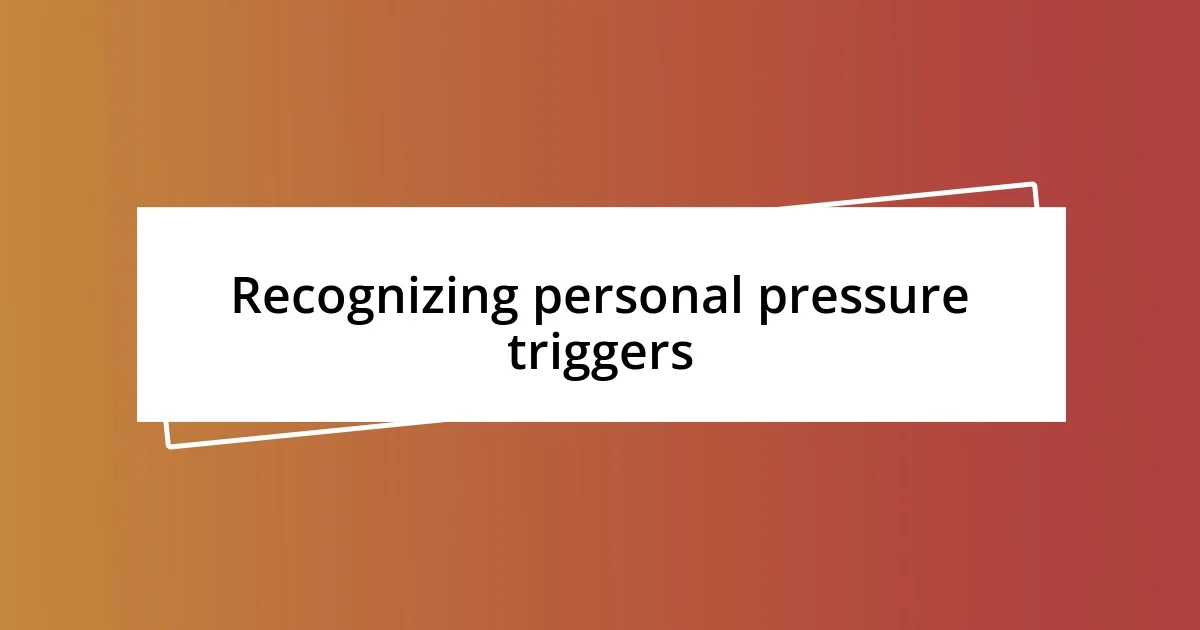
Recognizing personal pressure triggers
Recognizing what triggers my pressure response has been a key part of managing stress during games. For instance, I learned that specific environments—like playing against a rival team—can make my heart race and mind race even more. That awareness helps me prepare mentally; I know I can expect that adrenaline rush and strategize around it instead of feeling caught off guard.
I also discovered that certain moments, like being ahead in a score or having teammates count on me, can amplify my feelings of pressure. In one game, I found myself overthinking every decision when the stakes were highest. It was a turning point for me. By recognizing those triggers, I realized I could focus on the present moment instead of getting lost in what I deemed to be “the big picture.”
To keep things simple, I’ve started identifying my triggers through reflection and journaling after games. Over time, I’ve noticed patterns, like specific situations causing spikes in my stress. This intentional self-reflection has not only helped me cope but also laid the groundwork for improving my game performance overall.
| Pressure Trigger | Response |
|---|---|
| Playing Against Rivals | Heightened adrenaline, increased focus |
| Being Ahead in Score | Overthinking, potential anxiety |
| Crowd Expectations | Intensified pressure, then motivation |
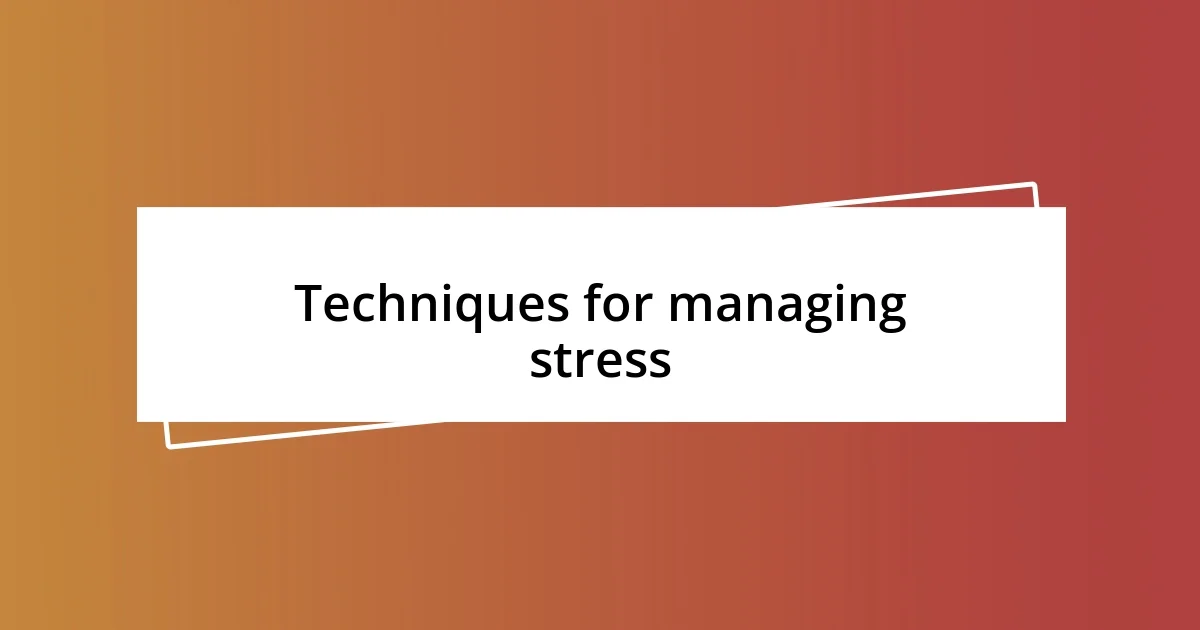
Techniques for managing stress
Managing stress effectively during games requires a toolkit of practical techniques. One strategy I hold dear is deep breathing. It’s incredible how something so simple can instill calm amidst chaos. Just inhaling deeply for a few counts and exhaling slowly can reset my focus. Once, in a high-stakes tournament, I felt my anxiety climbing; a few intentional breaths brought me back to the moment and sharpened my concentration.
Here are some techniques I often lean on:
- Deep Breathing: Inhale for four counts, hold for four, and exhale for six to center yourself.
- Positive Visualization: I picture myself succeeding in a challenging scenario before it happens, which helps me build confidence.
- Physical Movement: A quick stretch or a couple of jumping jacks clears my mind and invigorates my body.
- Mindfulness: Staying present by focusing on my senses, like the sounds around me, anchors me during intense moments.
- Routine: Creating a pre-game ritual, like listening to a favorite playlist, establishes a sense of normalcy and control.
Another valuable approach is reframing my thoughts about pressure. Instead of seeing it purely as a threat, I’ve started viewing it as a motivation tool. I remember a pivotal game where I chose to embrace the mounting tension, telling myself it was just the universe’s way of challenging me to rise to my full potential. This shift not only calmed my racing heart but also transformed my performance into something exhilarating rather than nerve-wracking. By redirecting pressure into drive, I unlock a deeper level of focus and inspiration.
- Positive Self-Talk: Reminding myself of past successes shifts my mindset from fear to confidence.
- Focus on the Process: Concentrating on what I can control, like my technique and strategy, keeps me grounded.
- Set Micro-Goals: Breaking the game into smaller, manageable objectives prevents me from feeling overwhelmed.
- Environmental Control: If possible, I adjust my surroundings to create a comfortable space that promotes focus.
- Seek Support: Talking openly with teammates about pressure can foster a supportive atmosphere that eases the collective burden.
In essence, these techniques have not only helped me manage stress but also enhanced my game experiences. It’s amazing to see how the right mindset can morph pressure from a foe into a fierce ally.

Mental exercises for focus
Mental exercises have become my secret weapon for maintaining laser-like focus. One technique I often return to is the method of visualization. Before high-pressure games, I close my eyes and vividly picture specific moments—like making the perfect play or scoring the winning point. It’s fascinating how this pre-play rehearsal not only boosts my confidence but also aligns my mind and body for action. Have you ever tried visualizing success before a big moment? If you haven’t, it’s something I highly recommend.
Another exercise I’ve found effective is practicing mindfulness. During games, I take brief mental breaks to focus on my immediate surroundings. I hone in on the sound of the crowd, the feel of my gear, or even the rhythm of my breath. When I first started doing this, I was surprised by how grounding it felt. It’s easy to get lost in the whirlwind of competition, but anchoring myself in the present moment reduces anxiety substantially. I remember a particularly tense match where I used this technique; it helped me regain my composure, and I played better than I had imagined.
Additionally, I keep a mental checklist to remind myself of the key aspects I want to focus on during a game. Instead of worrying about winning or losing, I concentrate on my skills and strategies—essentially, the process rather than the outcome. This shift in focus has transformed my entire approach to pressure. I’ve realized that when I can channel my energy into executing what I’ve practiced, the results take care of themselves. What about you? How do you keep your mind centered in the heat of competition?
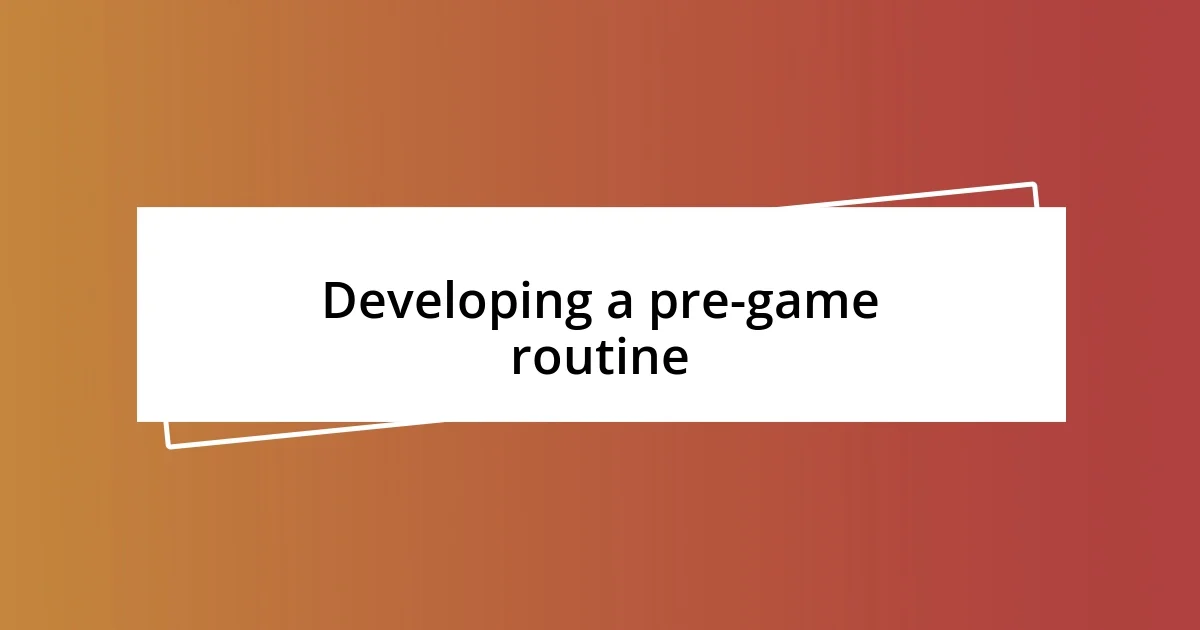
Developing a pre-game routine
Establishing a pre-game routine is crucial for setting the right tone before any competition. Personally, I’ve discovered that the few moments leading up to a game can significantly dictate how I perform under pressure. For me, it often starts by listening to a particular song that resonates with my competitive spirit. Have you ever noticed how certain songs can elevate your mood and mindset instantly? That’s what a good playlist does for me—it signals the shift from daily life to game mode.
I also make it a point to mentally run through my game plan while warming up. During this time, I visualize the key plays I need to execute; it’s like rehearsing for a performance. There was one game, in particular, where my coach had stressed the importance of a solid opening play. I took that to heart and visualized that moment repeatedly; when it came time, everything flowed perfectly. It reminded me that preparation isn’t just physical; it’s deeply mental too.
And then there’s the ritual of my final stretch—it’s essential. I’ve turned this into a moment of reflection, allowing myself to embrace both excitement and nerves. I remember sitting in the locker room before a big match, feeling the adrenaline start to creep in. Instead of resisting it, I acknowledged my feelings. It was a reminder that those nerves meant I cared. How do you handle those pre-game jitters? For me, it’s about embracing the pressure, knowing it’s part of what fuels my performance.
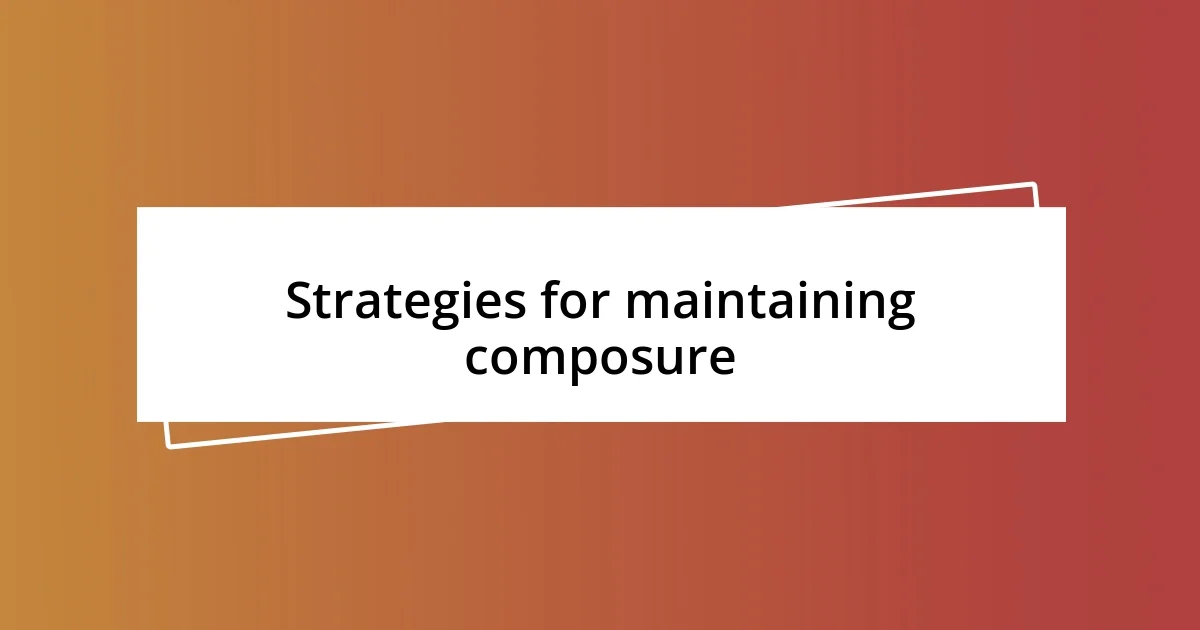
Strategies for maintaining composure
One strategy I rely on during games is deep breathing. It sounds simple, but taking a few slow, intentional breaths can work wonders when the pressure is on. I remember a match where my heart felt like it was racing out of my chest. By focusing on my breath, I could feel my heart rate slow down, and suddenly, the game felt more manageable. Have you tried this? It’s fascinating how something as basic as breathing can shift your mindset.
Another approach is to maintain a positive internal dialogue. In high-stress situations, I make an effort to replace negative thoughts with affirmations like “I’ve trained for this” or “I am prepared.” For instance, during a close game, I caught myself dwelling on past mistakes. Shifting to affirmations not only calmed me but also re-energized my focus. What do you tell yourself to stay positive in tough moments? I’ve learned that our minds can be our greatest allies or worst enemies, depending on the narrative we choose.
Lastly, I find grounding techniques particularly useful when things heat up. For me, this could mean focusing on the sensation of my feet on the ground or the texture of the ball in my hands. I recall a nail-biter in which I felt disoriented as the game intensity peaked. By taking a moment to ground myself, I was able to reconnect with my physically present self. Isn’t it amazing how little things can bring us back when we feel overwhelmed? Integrating these strategies has been key to my composure under pressure.
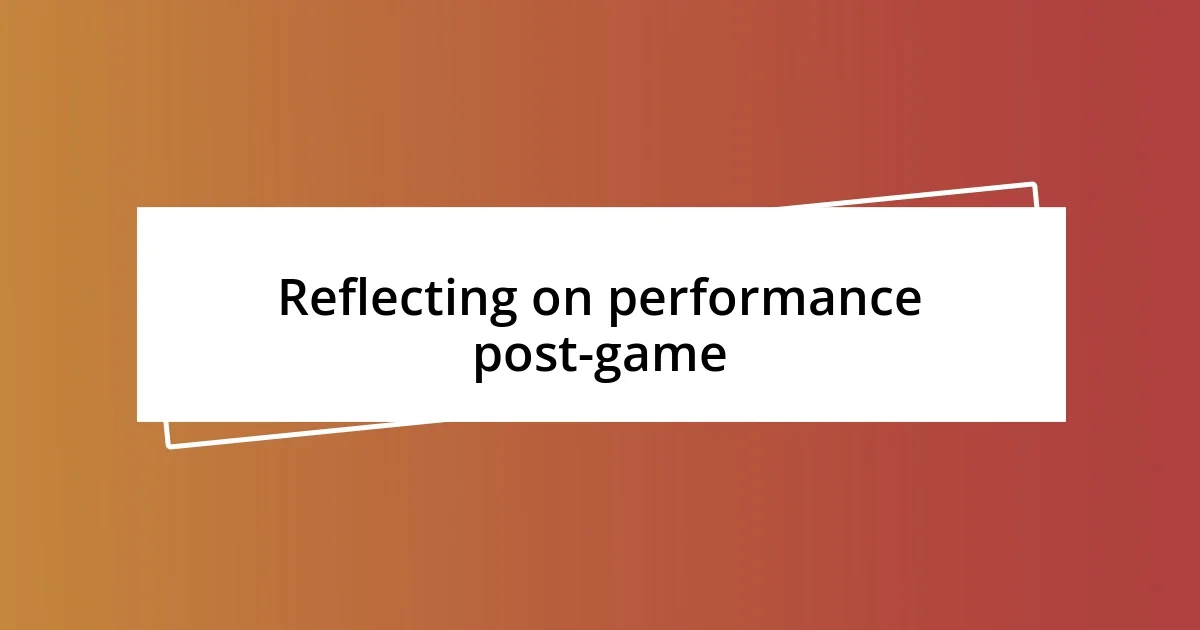
Reflecting on performance post-game
Reflecting on performance post-game is a key part of my growth as an athlete. After every game, I take time to analyze not just what I did well but also the moments that slipped through my fingers. There was a match where I missed a crucial opportunity to score, and that stung. I found myself asking, “What could I have done differently?” This self-reflection allowed me to identify patterns in my decision-making, turning moments of disappointment into learning experiences.
I often jot down notes after games, capturing my thoughts while they’re still fresh. It’s like a mental debriefing. For example, in a particularly intense game where tensions ran high, I realized my emotions were all over the place. By taking a moment to write, I could process those feelings—anger, excitement, or frustration—rather than letting them fester. Has writing ever helped you untangle your thoughts? I believe it lets you sift through the chaos and find the gems of insight that can elevate your game.
Moreover, discussing my performance with teammates is invaluable. The conversations we have post-game create a sense of camaraderie, which is comforting. I remember a time when a teammate pointed out a systemic issue we all faced. Instead of feeling alone in my mistakes, I realized we were all in the same boat. How often do we overlook the power of collaboration in self-reflection? For me, it’s essential—not just for improving my individual skills but for building a united team that grows stronger together.












